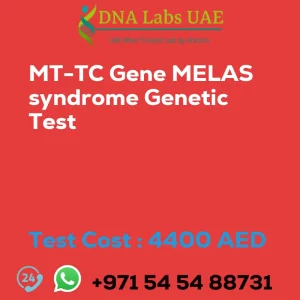DTNA Gene Left Ventricular Noncompaction 1 with or without Congenital Heart Defects Genetic Test
At DNA Labs UAE, we offer the DTNA Gene Left Ventricular Noncompaction 1 with or without Congenital Heart Defects Genetic Test. This test helps in diagnosing and understanding left ventricular noncompaction, a heart muscle disorder characterized by prominent ridges in the left ventricle.
Test Details
The DTNA gene, also known as dystrobrevin alpha (DTNA), is associated with left ventricular noncompaction (LVNC) 1, with or without congenital heart defects. Our NGS (Next-Generation Sequencing) genetic testing method allows us to analyze multiple genes simultaneously and detect variations or mutations that may be linked to LVNC.
Test Components
The DTNA Gene Left Ventricular Noncompaction 1 with or without Congenital Heart Defects Genetic Test includes:
- Price: 4400.0 AED
- Sample Condition: Blood or Extracted DNA or One drop Blood on FTA Card
- Report Delivery: 3 to 4 Weeks
- Method: NGS Technology
- Test Type: Cardiovascular Pneumology Disorders
- Referring Doctor: Cardiologist
- Test Department: Genetics
Pre Test Information
Before undergoing the DTNA Gene Left Ventricular Noncompaction 1 with or without Congenital Heart Defects Genetic Test, it is important to provide the clinical history of the patient. Additionally, a genetic counseling session will be conducted to draw a pedigree chart of family members affected by LVNC and the DTNA gene.
Benefits of NGS Genetic Testing for LVNC
NGS genetic testing helps identify variations or mutations in the DTNA gene that may contribute to the development of left ventricular noncompaction. By understanding these genetic variations, healthcare professionals can provide more accurate diagnoses, prognosis, and personalized treatment plans for affected individuals. Early intervention and monitoring can also be implemented for individuals at risk of developing LVNC.
Genetic Counseling
Genetic testing and its results have significant implications for individuals and their families. Therefore, it is crucial to consult qualified healthcare professionals who specialize in genetics. Genetic counseling is recommended before and after the test to discuss the potential risks, benefits, and limitations of testing, as well as the implications of the results.
| Test Name | DTNA Gene Left ventricular noncompaction 1 with or without congenital heart defects Genetic Test |
|---|---|
| Components | |
| Price | 4400.0 AED |
| Sample Condition | Blood or Extracted DNA or One drop Blood on FTA Card |
| Report Delivery | 3 to 4 Weeks |
| Method | NGS Technology |
| Test type | Cardiovascular Pneumology Disorders |
| Doctor | Cardiologist |
| Test Department: | Genetics |
| Pre Test Information | Clinical History of Patient who is going for DTNA Gene Left ventricular noncompaction 1, with or without congenital heart defects NGS Genetic DNA Test. A Genetic Counselling session to draw a pedigree chart of family members affected with DTNA Gene Left ventricular noncompaction 1, with or without congenital heart defects NGS Genetic DNA Test gene DTNA |
| Test Details |
DTNA gene, also known as dystrobrevin alpha (DTNA), is associated with a condition called left ventricular noncompaction (LVNC) 1, with or without congenital heart defects. LVNC is a heart muscle disorder characterized by prominent trabeculations (ridges) in the left ventricle of the heart. NGS (Next-Generation Sequencing) genetic testing is a method used to analyze multiple genes simultaneously and detect variations or mutations that may be associated with certain diseases or conditions. In the case of LVNC, NGS genetic testing can help identify variations or mutations in the DTNA gene that may contribute to the development of the condition. By identifying these genetic variations, healthcare professionals can better understand the underlying causes of LVNC and provide more accurate diagnoses, prognosis, and personalized treatment plans for affected individuals. NGS genetic testing can also help in identifying individuals who may be at risk of developing LVNC, allowing for early intervention and monitoring. It is important to note that genetic testing should be performed and interpreted by qualified healthcare professionals who specialize in genetics, as the results can have significant implications for individuals and their families. Genetic counseling is often recommended before and after genetic testing to discuss the potential risks, benefits, and limitations of testing, as well as the implications of the results. |








